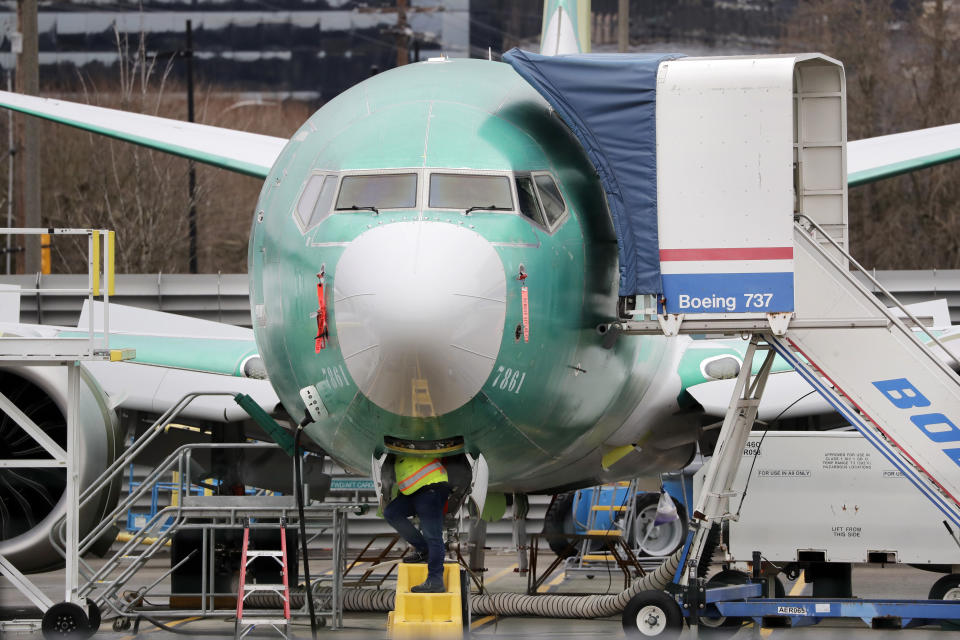Boeing sees Q3 earnings improvement but warns on layoffs as coronavirus, 737 MAX weigh
Boeing (BA) on Wednesday reported narrower-than-expected losses and higher revenue during the third quarter, yet the dual crises stemming from the COVID-19 pandemic and its idled 737 MAX flagship are likely to lead to deep layoffs, the company warned.
Here are key metrics from the report, versus what Wall Street was expecting, according to a consensus forecast compiled by Bloomberg:
Revenue: $14.1 billion vs $13.84 billion expected
Adjusted loss per share: $1.39 cents vs $2.384 expected
GAAP share loss: 79 cents vs. $1.588 expected
Operating cash flow: -$4.82 billion
In its earnings report, the company said it continued to make “steady progress” on getting the flagship plane back in the air. Still, Boeing warned that efforts to reshape the company would lead to lower headcount, as the coronavirus and grounded plane “significantly impacted” the bottom line. CNBC reported on Wednesday that the company is bracing for thousands of layoffs between now and the end of 2021.
Meanwhile, Boeing burned through nearly $5 billion during Q3, more than double its loss during the comparable 2019 quarter.
“As the company resizes its operations to align with market realities, Boeing expects to continue lowering overall staffing levels through natural attrition, as well as voluntary and involuntary workforce reductions, and recorded additional severance costs in the third quarter,” the company said.
In pre-market trading, the company’s stock jumped by over a percent from Tuesday’s closing levels, as investors cheered the encouraging results. However, Boeing’s shares are trading near $155, a fraction of their 52-week highs above $375.
Boeing’s woes with the 737 MAX have dominated its agenda for the better part of the last 2 years, and eroded public trust in the company while drawing increased regulatory scrutiny. Last week, The Wall Street Journal reported that Boeing was quietly gauging interest in a new airplane that may help the embattled aerospace giant turn the page on the 737 MAX crisis.
"The global pandemic continued to add pressure to our business this quarter, and we're aligning to this new reality by closely managing our liquidity and transforming our enterprise to be sharper, more resilient and more sustainable for the long term," said Boeing President and CEO Dave Calhoun.
"Our diverse portfolio, including our government services, defense and space programs, continues to provide some stability for us as we adapt and rebuild for the other side of the pandemic,” he added.

The company’s struggles have also converged with the escalating economic crisis sparked by the COVID-19 pandemic, which have badly undermined the company’s commercial aircraft deliveries in a sector that’s been ravaged by the ongoing outbreak. Last week, Southwest Airlines (LUV) placed an order for new aircraft via Boeing competitor Airbus, while American Airlines (AAL) pushed back delivery of 18 MAX jets that were scheduled for the next 2 years.
Appearing at Yahoo Finance’s All Markets Summit on Monday, Delta (DAL) CEO Ed Bastian said that the airline industry has “never seen anything that comes close to the challenges of managing through the pandemic.”
Although demand is slowly rebounding, Bastian added that “there's no question the recovery is quite choppy,” and that the industry’s full recovery was likely a “couple” of years away.
To date, Boeing has tapped a loan facility, cut costs and spending, and suspended its coveted dividend. In a reflection of the uncertainty, Boeing’s total debt load has surged since last year, while the company delivered far fewer commercial aircraft in Q3 when compared to 2019.
Commercial airlines are reeling from the restrictions that have kept consumers sequestered at home and out of the skies — which means they have virtually no use for new aircraft as passenger traffic plunges.
Boeing’s troubles have had a ripple effect on the vast U.S. economy, which faces months of uncertainty and an uneven recovery from the lockdowns from the spring. Cancellations and lack of orders for new commercial aircraft have an impact on economic growth and jobs data, all of which usually shows up in high frequency data.
Yet September’s durable goods orders, which clocked in at a stronger than expected 1.9%, saw an unexpected recovery in commercial aircraft segments, even as Boeing grappled with canceled orders.
Javier David is an editor for Yahoo Finance. Follow Javier on Twitter: @TeflonGeek
Read the latest financial and business news from Yahoo Finance
Follow Yahoo Finance on Twitter, Facebook, Instagram, Flipboard, SmartNews, LinkedIn, YouTube, and reddit.


